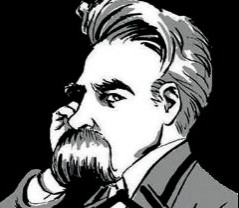In Beyond Good and Evil pg. 49, Friedrich Nietszche writes: (Walter Kaufmann translates) “Nobody is very likely to consider a doctrine true merely because it makes people happy or virtuous–except perhaps the lovely “idealists” who become effusive about the good, the true, and the beautiful and allow all kinds of motley, clumsy, and benevolent desiderata to swim around in utter confusion in their pond. Happiness and virtue are no arguments. But people like to forget–even sober spirits–that making unhappy and evil are no counter-arguments. Something might be true while being harmful and dangerous in the highest degree. Indeed, it might be a basic characteristic of existence that those who would know it completely would perish, in which case the strength of a spirit should be measured according to how much of the “truth” one could still barely endure–or to put it more clearly, to what degree one would require it to be thinned down, shrouded, sweetened, blunted, falsified.”

What I am excavating from this text is that Nietzsche argues the purity of truth will always be concealed (in many ways more than this quotation leads; ie language). As some form of truth hits the masses of society it will be watered down to fit their lack of mental capacities for “purer” truth. When said burgeoning truth is birthed to the masses it is “…require[d] to be thinned down, shrouded, sweetened, blunted, falsified.”
This particular pericope has a context in an argument apropos of a new society of philosophers Nietzsche calls “free spirits,” but I find it to be applicable for other versions of trends/fads of truth that our human history is wrought with. Whatever ethos a time and place may embody, it seems that Nietzsche’s claim is relevant. As a twenty-first century man in America, I am considerning Christianity. Perhaps the “truer” version of Christianity is concealed in America contemporarily? Could it be the case that American Christianity looks more like American idealism rather than Christian “truth” (I keep quoting the word “truth” due to the irony of that would occur if it were used as an absolute while reading Nietszche). Perhaps it is essentially capitalistic Christianity where both capitialism and Christianity are “thinned down, shrouded, sweetened, blunted, falsified.”
And what of other “Christianities” in its 2 millennia history? Would all of these be some “thinned” version once becoming and exoteric truth? well, part truth? If Nietzsche’s proposal is correct, all things closer to the truth must essentially be esoteric. Perhaps this is reason for Christians to look to the church in Acts for the most truthful form of Christianity. But how can Nietzsche make claims about truth, or use it in his vocabulary altogether? Are we not simply deduced to our drives anyway?


I’m stoked to read a blog about Nietszche, because I have not read any of his works yet. I am hungry for the big boy.
I like the Nietszche’s point that neither the happiness nor the unhappiness caused by a specific doctrine prove the truth of that doctrine. We do take happiness into account when we consider the truth of a doctrine, but as N writes, it is never just a matter of “merely” what will make people happy/unhappy.
But even when we consider mere happiness/unhappiness, it is not always just a case of what makes us feel good/bad. I think of Freud’s conception of the pleasure and death drives; the pleasure drive being the impetus to maintain homeostasis, and the death drive the impetus to disrupt homeostasis. In other words, the pleasure drive prompts me to act in such a way that my life remains stable and balanced, while the death drive prompts me to throw things out of whack. These drives operate in myriad ratios within an individual psyche. That is why some people won’t rest until they have made themselves miserable.
I don’t think that Nietszche had this in mind when he penned the above-words. However, I do think that it supports his point from a different angle, as it complicates commonsense notions of happiness.
As for your questions, I wish I knew more about Nietszche, but as it stands I cannot hazard a good guess. What do your instincts tell you? How does N conceive of truth?
Thanks for your comment willwindow! And for your follow-up question as well. First, I do think N is correct in arguing for any truth being concealed to some degree. I think this is what makes him a catalyst for Postmodern thought. He illustrates the situatedness of the individual and illumines the half-truthed pretenses by which much philosophical argument is based off of.
I think you’ve already seen the paradox in N’s argument. He makes truth claims, but illustrates the failure in making truth claims altogether. This, seems to be the case as far as I can tell. I’m sure there is more. So truly, your question is my question.
I do think it interesting that N’s magnum opus is essentially critiques rather than posited truths. Perhaps this is our answer!
“essentially critiques rather than posited truths.”
It’s funny you should say that, because I’m not sure if I’ve ever heard/read any self-identifying postmodernist ever come up with a truly constructive thought (at least not when they’re being epistemically consistent). Uncovering the contexts and biases of others is clearly valuable, and inasmuch as we are able we should be self-critical. However, if everything is context (ie.: thinned down, shrouded, sweetened, blunted, falsified) isn’t the deconstructive task a bit of a narcissistic black-hole?